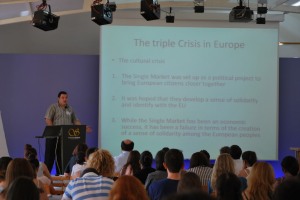By Dr. Soeren Keil
In recent years, I have been teaching at a number of summer schools all over Europe, and for the last three years, I have been in charge of organising a summer at Canterbury Christ Church University on “Federalism, Multinationalism and the Future of Europe.”
The experiences one gains at these summer schools are invaluable. This is certainly true for the students, for whom participation in summer courses in addition to internships and work experiences becomes ever more important in a competitive environment. However, I believe that this is also true for the people who teach in these summer schools. I have always enjoyed teaching in the summer schools I have been involved in and discussing my work with students, but beyond that I have been able to learn a lot and pick up a lot of cultural knowledge so to say.
When I was in charge of the 2014 version of the Canterbury summer school on “Federalism, Multinationalism and the Future of Europe” it was interesting to see how young people, many with no background in federal studies, would engage and react to federal theory, particularly the idea of federal values in the European Union. Reactions ranged from massive support to a complete denial of federal values such as solidarity, reciprocity and peace, but I was surprised of how balanced most views were on a European federal project, one which is still being developed and one which will massively influence the lives of all students who participated in the summer school.
Likewise, when I participated in a summer school in continental Europe, I realised once again how different cultural and historical experiences shape our personal opinions and attitudes towards certain concepts. When discussing the concept of “imposed federalism”, which I have studied widely, I had to recognise that the idea of imposing anything is rather alien to many African representatives due to the experiences of colonialism. I still believe that in cases like the Democratic Republic of Congo, where one intervention was followed by new violence and another intervention, it is important to impose some basic state structures in addition to send troops to end the violence. While I am also a supporter of advising and educating political elites and citizens in countries that are in transition, I am aware of the fact that advice alone will not solve many conflicts. I do not know how many people have become rich by advising different actors in the Middle East conflict, but I guess that it is a large number, yet there is still no solution. Sometimes, it is important to “create facts on the ground” and change a situation, as was done in the case of Kosovo, in Bosnia and Herzegovina, in Iraq after 2003, and in Afghanistan after 2001. Now, I am not saying that these interventions were a success, but what I am saying is that when the lack of state structures is a core source of conflict (or the state structures themselves are, as in Iraq under Saddam Hussain), then maybe creating new structures through imposition is the way to go forward. As long as local elites are allowed to change these structures through formal constitutional processes later on, I see no problem here. Most peace arrangements are imposed, and why can border changes be imposed but not power-sharing?
Yet, finding support for this opinion in a classroom full of students mainly from the developing world and mainly working as practitioners is difficult. I have learnt to listen to their concerns, and take on board their feedback. I will continue to tell my Ethiopian colleagues that they do not live in a democracy, despite of what their government tells them. I will also keep pointing out to my Chinese colleagues and students, that China’s minority rights protection is a joke, a really bad one particularly in Tibet (but not only there). Sometimes, that is something I have learnt as well, it is important to disagree and defend your own point of view. Being a “Westener” and a liberal in many respects might automatically create some resentments and bias. However, I still believe that Russia should not lecture
the West on International Law. China should not allow us to take human rights off the agenda only because we like cheap clothes, and Uzbekistan should not be the country to question our democratic standards. The West does not get it always right. The West gets it wrong, too. But I am not signing up to Western values. One of the other things I have learnt at summer schools is that human rights are universal and need to be promoted as such. They should not be compromised. Not in the West, and not anywhere else. This is worth fighting for, and sometimes, this means that bad decisions have to be taken and that mean and horrible people will have to be included in political deals. Such is life. However, searching for peaceful solutions, for new mechanisms to protect human rights, and for ways to include those oppressed and excluded in power-sharing deals will become more and more important, in a world that is becoming more diverse and more conflict-ridden. Young people are willing to listen to different ideas, challenge these, and maybe begin to critically think about their own countries and how to change things there. This, too, I have learnt. There is hope, there is always hope.
 Politics
Politics Anna Vanaga
Anna Vanaga 456
456


